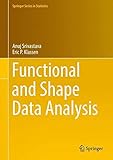Functional and Shape Data Analysis [electronic resource] / by Anuj Srivastava, Eric P. Klassen.
Material type: TextSeries: Springer Series in StatisticsPublisher: New York, NY : Springer New York : Imprint: Springer, 2016Description: XVIII, 447 p. 247 illus., 182 illus. in color. online resourceContent type:
TextSeries: Springer Series in StatisticsPublisher: New York, NY : Springer New York : Imprint: Springer, 2016Description: XVIII, 447 p. 247 illus., 182 illus. in color. online resourceContent type: - text
- computer
- online resource
- 9781493940202
- 519.5 23
- QA276-280
1. Motivation for Function and Shape Analysis -- 2. Previous Techniques in Shape Analysis -- 3. Background: Relevant Tools from Geometry -- 4. Functional Data and Elastic Registration -- 5. Shapes of Planar Curves -- 6. Shapes of Planar Closed Curves -- 7. Statistical Modeling on Nonlinear Manifolds -- 8. Statistical Modeling of Functional Data -- 9. Statistical Modeling of Planar Shapes -- 10. Shapes of Curves in Higher Dimensions -- 11. Related Topics in Shape Analysis of Curves -- A. Background Material -- B. The Dynamic Programming Algorithm -- References -- Index.
This textbook for courses on function data analysis and shape data analysis describes how to define, compare, and mathematically represent shapes, with a focus on statistical modeling and inference. It is aimed at graduate students in analysis in statistics, engineering, applied mathematics, neuroscience, biology, bioinformatics, and other related areas. The interdisciplinary nature of the broad range of ideas covered—from introductory theory to algorithmic implementations and some statistical case studies—is meant to familiarize graduate students with an array of tools that are relevant in developing computational solutions for shape and related analyses. These tools, gleaned from geometry, algebra, statistics, and computational science, are traditionally scattered across different courses, departments, and disciplines; Functional and Shape Data Analysis offers a unified, comprehensive solution by integrating the registration problem into shape analysis, better preparing graduate students for handling future scientific challenges. Recently, a data-driven and application-oriented focus on shape analysis has been trending. This text offers a self-contained treatment of this new generation of methods in shape analysis of curves. Its main focus is shape analysis of functions and curves—in one, two, and higher dimensions—both closed and open. It develops elegant Riemannian frameworks that provide both quantification of shape differences and registration of curves at the same time. Additionally, these methods are used for statistically summarizing given curve data, performing dimension reduction, and modeling observed variability. It is recommended that the reader have a background in calculus, linear algebra, numerical analysis, and computation. Presents a complete and detailed exposition on statistical analysis of shapes that includes appendices, background material, and exercises, making this text a self-contained reference Addresses and explores the next generation of shape analysis Focuses on providing a working knowledge of a broad range of relevant material, foregoing in-depth technical details and elaborate mathematical explanations Anuj Srivastava is a Professor in the Department of Statistics and a Distinguished Research Professor at Florida State University. His areas of interest include statistical analysis on nonlinear manifolds, statistical computer vision, functional data analysis, and statistical shape theory. He has been the associate editor for the Journal of Statistical Planning and Inference, and several IEEE journals. He is a fellow of the International Association of Pattern Recognition(IAPR) and a senior member of the Institute for Electrical and Electronic Engineers (IEEE). Eric Klassen is a Professor in the Department of Mathematics at Florida State University. His mathematical interests include topology, geometry, and shape analysis. In his spare time, he enjoys playing the piano, riding his bike, and contra dancing.
There are no comments on this title.



























